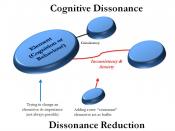Explain the concept of cognitive dissonance, giving examples of when this phenomen is likely to occur. Why do people in general try to reduce cognitive dissonance? Give examples.
How might retailers try to reduce a consumer's cognitive dissonance? And how might work be responsible for high levels of dissonance?
Explain the phenomenom of relative deprivation. Does it explain the high levels of dissatisfaction, depression and deviance in our society? Why does Oliver James call Britain "a low serotonin society"?
Chapter I
Cognitive Dissonance describes a disharmonised mental state in which people feel a discrepancy between things they already know or believe and new information or opinions. ATHERTON J S (2003) Learning and Teaching: Cognitive Dissonance [On-line], UK
An individual can have cognitions about, for example, behaviours, attitudes, beliefs or feelings and the cognitions can be, for example, about oneself, another person, a group or general topics. Cognitive Dissonance is not a logical principle but rather a psychological one.
This means, that it is often impossible to give a rational explanation for a behaviour, an opinion or a decision which had been made. Hence one person may feel dissonance about a certain aspect whereas another person may think it is consonant. HARMEN-JONES et al. (1999)
When, for instance, a decision between two similar goods has to be made one alternative will be weigh against the other and the one which is considered to be the best will be taken. After having bought the product, however, the owner will probably experience cognitive dissonance as he or she might no longer be sure whether the decision was right or wrong. To make sure that the decision was right the person can now search for positive information about the purchased product or negative information about the rejected product or even ask a person who...


